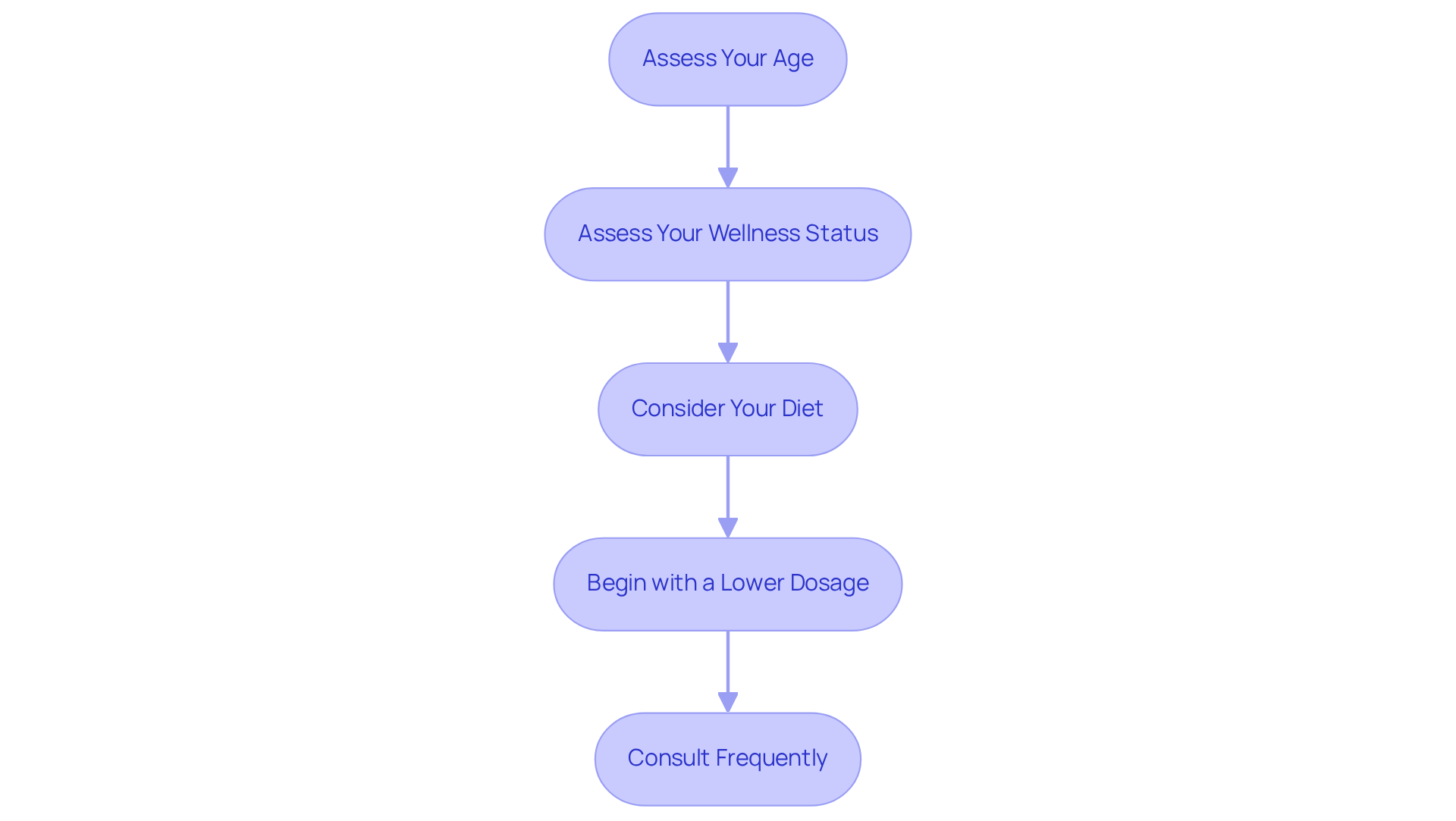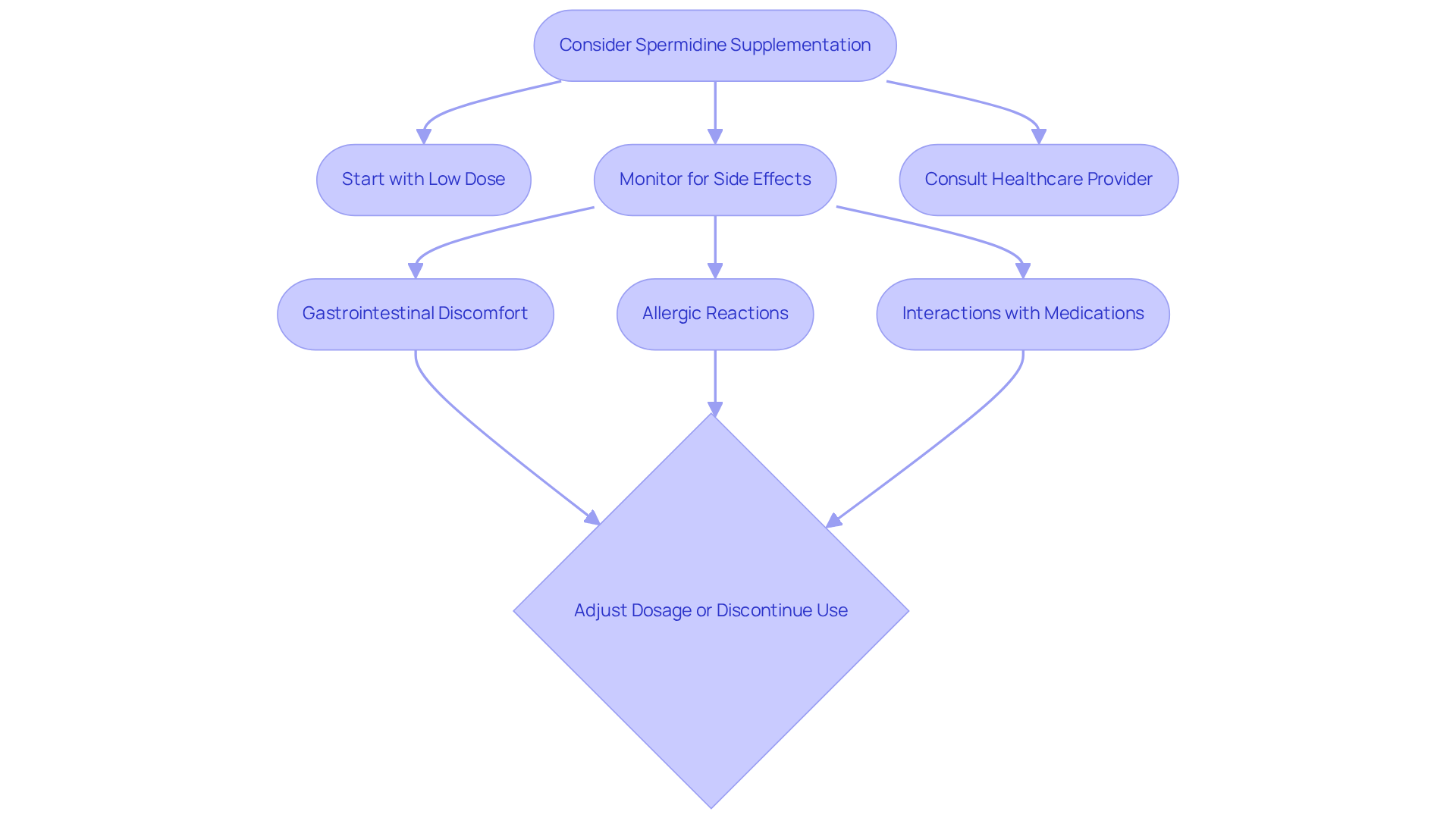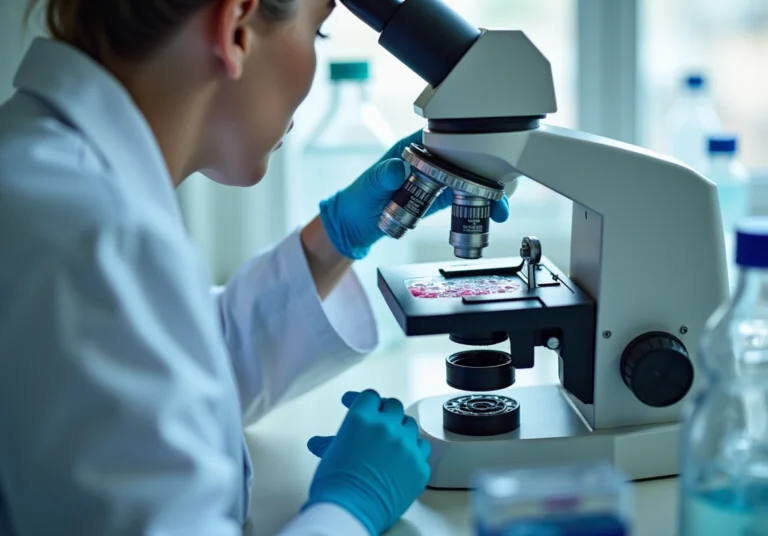Calculate Your Ideal Spermidine Dosage for Optimal Health
Overview
The ideal spermidine dosage for optimal health can vary significantly based on factors such as age, dietary intake, and individual health status. Generally, a recommendation of 1-5 mg per day is suitable for most individuals. However, older adults may require higher doses, typically ranging from 3-5 mg, to compensate for the natural declines in spermidine levels that occur with age. This highlights the importance of consulting healthcare professionals for personalized dosage adjustments, ensuring that individuals receive the most effective and safe recommendations tailored to their specific needs.
Introduction
Spermidine, a naturally occurring compound found in all living cells, has emerged as a key player in promoting health and longevity. Its benefits—ranging from enhanced cognitive function to improved heart health—make it a topic of increasing interest among health enthusiasts and researchers alike.
However, determining the ideal dosage for spermidine supplementation can be complex. Factors such as age, dietary habits, and individual health conditions all influence this decision.
How can one navigate these variables to find the optimal spermidine dosage that aligns with their health goals? Exploring these aspects will help you make informed choices about spermidine supplementation.
Understand Spermidine: What It Is and Its Health Benefits
Spermidine is a naturally occurring polyamine found in all living cells, playing a vital role in cellular processes such as autophagy, the body’s method of cleaning out damaged cells and regenerating new ones. Research indicates that this compound can promote longevity, improve heart health, and enhance cognitive function. Notably, it is generated by intestinal bacteria, emphasizing the significance of preserving a healthy gut microbiome to boost levels of this compound.
Foods rich in spermidine include:
- Aged cheese
- Mushrooms
- Soy products
This makes it attainable through a balanced diet. Furthermore, the probiotic Bifidobacterium lactis has been demonstrated to elevate certain levels in the gut, offering useful dietary guidance for individuals aiming to enhance their well-being.
The health advantages of spermidine are particularly significant for older adults, as studies have shown it is associated with a 24% reduction in death rates and a 27% decline in the risk of cognitive impairment. Understanding these benefits is essential for determining the appropriate spermidine dosage for supplementation; it is suggested that the minimum effective spermidine dosage is around one milligram per day, with a Phase II trial indicating that 1.2 mg/day was safe and tolerable.
While supplementation with spermidine can be beneficial, the optimal method to elevate its levels may be through diet, as it also provides other longevity-associated nutrients such as polyphenols and fiber. As the science of aging continues to develop, spermidine emerges as a promising element in the pursuit of healthier aging.

Identify Factors Influencing Spermidine Dosage Requirements
Several factors can significantly influence the ideal dosage of spermidine for individuals, including:
- Age: As individuals age, natural levels of spermidine in the body decline. This necessitates higher spermidine dosage for older adults to achieve optimal health benefits. Research suggests that older adults often need a spermidine dosage of 3-5 mg daily to compensate for this decline. Generally, the ideal spermidine dosage varies from 1-5 mg each day, with most individuals benefiting from starting at 1 mg and adjusting according to their personal requirements.
- Condition Status: Specific medical issues, such as chronic illnesses or metabolic disorders, along with certain medications, can influence how the body metabolizes this compound. This leads to the necessity for modifications in spermidine dosage. Individuals with these conditions should consult healthcare professionals to tailor their supplementation accordingly.
- Dietary Intake: A diet rich in spermidine-containing foods, such as aged cheese, wheat germ, and mushrooms, may reduce the need for supplemental doses. Those consuming these foods regularly might find that lower doses are adequate for sustaining well-being.
- Lifestyle Factors: Elements such as stress levels, physical activity, and overall lifestyle can affect the body’s use of this compound. For instance, athletes may benefit from higher doses due to increased metabolic demands.
Identifying these elements is crucial for establishing the suitable spermidine dosage of this potent compound. By doing so, individuals can optimize the health advantages linked to it.

Calculate Your Ideal Spermidine Dosage: A Step-by-Step Guide
To calculate your ideal spermidine dosage, follow these steps:
-
Assess Your Age: Determine your age group. For individuals aged 18-50, a spermidine dosage of 10 mg is often recommended as a starting dose. For those over 50, consider starting with a spermidine dosage of 20 mg, as higher amounts have been linked to improved wellness results. The minimum effective spermidine dosage of this compound is 1 mg daily, which can be beneficial for individuals who are just starting.
-
Assess Your Wellness Status: Speak with a medical professional to discuss any current medical issues or prescriptions that may impact your dosage. This is vital, particularly as this compound has been associated with numerous health advantages, such as immune support and cognitive enhancement.
-
Consider Your Diet: Examine your diet for natural sources of this compound. Foods like natto, green peas, and shiitake mushrooms are abundant in this beneficial compound. If your diet includes these foods, you may require a lower supplemental dose to achieve optimal levels. The European Union’s Food and Safety Authority recommends not exceeding a daily intake of 6 mg of this compound to avoid potential side effects.
-
Begin with a lower spermidine dosage (e.g., 1-5 mg) and gradually increase it based on your body’s response. Monitoring for any side effects or wellness improvements is essential, as individual reactions can vary. As Dr. David Sinclair notes, consistently incorporating spermidine supplements into your routine can enhance your overall well-being and promote longevity.
-
Consult Frequently: Regularly check in with a healthcare provider to adjust your dosage as needed based on ongoing wellness evaluations. This ensures that your supplementation aligns with your health goals and dietary intake. Be aware of any adverse reactions and discontinue use if necessary.

Evaluate Safety and Side Effects of Spermidine Supplementation
Spermidine supplementation is widely regarded as safe for most individuals when the spermidine dosage is within the recommended limits. The European Union’s Food and Safety Authority advises a daily intake of 6 mg of a specific compound found in supplements. However, it is important to be aware of potential side effects, which may include:
- Gastrointestinal Discomfort: Mild stomach upset or bloating can occur, especially at higher doses. While case studies have noted instances of gastrointestinal discomfort among participants, safety and tolerability studies indicate high compliance rates and no significant adverse effects. This underscores the importance of monitoring personal responses to supplementation.
- Allergic Reactions: Although rare, allergic reactions may occur, particularly in those sensitive to wheat germ, a common source of this compound.
- Interactions with Medications: It is essential to consult with a healthcare provider if you are taking medication, as spermidine may interact with certain drugs and potentially affect their efficacy. Discussing possible interactions is vital for ensuring safe and effective supplementation.
To minimize the risk of side effects, it is advisable to begin with a lower spermidine dosage and gradually increase it while closely observing your body’s reactions. Should gastrointestinal discomfort or any adverse effects arise, consider reducing the dosage or discontinuing use altogether. Consulting a healthcare professional is recommended to ensure safe and effective supplementation, particularly regarding any potential interactions with medications.

Conclusion
Understanding the ideal spermidine dosage is crucial for optimizing health benefits associated with this powerful compound. Recognizing the significance of spermidine in promoting cellular health, longevity, and overall well-being enables individuals to take informed steps toward enhancing their health through both dietary sources and supplementation.
Several essential factors influence spermidine dosage, including age, health conditions, dietary intake, and lifestyle choices. For instance, older adults may require higher dosages to compensate for natural declines in spermidine levels, while those consuming a diet rich in spermidine-containing foods might need less supplementation. Furthermore, consulting healthcare professionals to tailor dosages based on individual needs is emphasized, ensuring a safe and effective approach to supplementation.
Incorporating spermidine into daily routines can significantly contribute to health and longevity. By carefully calculating the ideal dosage and monitoring personal responses, individuals can harness the potential of spermidine to enhance their well-being. Embracing a proactive approach to health, including a balanced diet and informed supplementation, can lead to a more vibrant and healthier life, underscoring the importance of understanding and optimizing spermidine intake.
Frequently Asked Questions
What is spermidine?
Spermidine is a naturally occurring polyamine found in all living cells, essential for cellular processes such as autophagy, which is the body’s method of cleaning out damaged cells and regenerating new ones.
What are the health benefits of spermidine?
Research indicates that spermidine can promote longevity, improve heart health, and enhance cognitive function. It is particularly beneficial for older adults, associated with a 24% reduction in death rates and a 27% decline in the risk of cognitive impairment.
How is spermidine produced in the body?
Spermidine is generated by intestinal bacteria, highlighting the importance of maintaining a healthy gut microbiome to boost its levels.
What foods are rich in spermidine?
Foods rich in spermidine include aged cheese, mushrooms, and soy products, making it attainable through a balanced diet.
How can probiotics affect spermidine levels?
The probiotic Bifidobacterium lactis has been shown to elevate certain levels of spermidine in the gut, providing dietary guidance for individuals looking to enhance their well-being.
What is the recommended dosage for spermidine supplementation?
The minimum effective dosage of spermidine is suggested to be around one milligram per day, with a Phase II trial indicating that 1.2 mg/day was safe and tolerable.
Is it better to obtain spermidine through diet or supplementation?
While supplementation can be beneficial, the optimal method to elevate spermidine levels may be through diet, as it also provides other longevity-associated nutrients such as polyphenols and fiber.
Why is spermidine significant in the science of aging?
As research on aging continues to develop, spermidine emerges as a promising element in the pursuit of healthier aging due to its various health benefits and potential impact on longevity.






